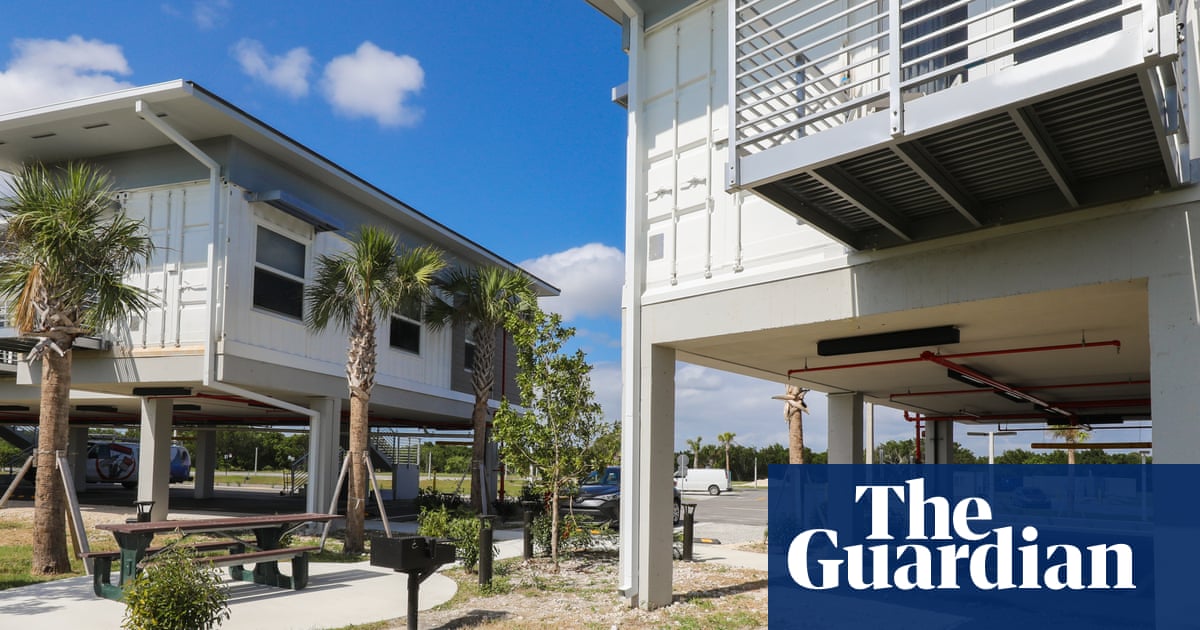Acollection of repurposed shipping containers, welded together and fitted out to create an innovative new eco-hotel inside one of the country’s most popular national parks, offers a vision of revival and resilience at the beginning of another potentially active Atlantic hurricane season.
The containers exist as the elevated 24-room Flamingo Lodge at the exposed southern tip of Florida’s Everglades national park. It was built to replace the 1960s-era cinderblock construction that was finallydemolished in 2009, four years after back-to-back hurricanes, Katrina and Wilma, tore it apart.
With the climate crisis fuelingstronger and more frequent major hurricanes, which can push ahead of them devastating storm surges, many doubted if either the will or finance existed to bring a permanent lodging option back to the vulnerable area for the first time in almost 20 years.
But the determination to build it weathered further storms that delayed construction, a redrawing of plans, labor shortages, supply chain complications and the coronavirus pandemic. National Park Service (NPS) managers say that, despite the challenges, it was unthinkable to not bring back moments denied to day-trippers making the 38-mile drive from the park entrance in Homestead.
“There were many reasons to rebuild Flamingo Lodge. We heard from visitors that generations of people who had come that this was a destination, the opportunity to spend the night inside a national park and expand and enhance their experience,” said Allyson Gant, the NPS ranger who is chief of communications for the wildlife-rich Everglades park.
“You’re there to see the stars at night, see the sun rise, or hear the birds in the morning, or to encounter the mosquitoes at night, to see the difference from the daytime.”
The absence of the lodge had become increasingly conspicuous as the outpost gradually built back from the devastation of the storms. While Flamingo’s campsite, marina and general store slowly returned to functionality, officials wrestled with how to restore an enduring and more comfortable alternative to a sleeping bag on the ground.
Replicating what was there before – a ground-level hotel with more than 100 rooms and a swimming pool – was out of the question because of the threat of another Katrina or Wilma, or 2017’s Hurricane Irma, which destroyed the visitor center and swamped a chunk large of the 1.5m-acre park with a 12ft wall of water.
“Sustainability was hugely important and integrated into the design and the building of the lodge. It was finding that balance, just like we do with many things in the National Park Service, between what we have today and what we want to take into the future,” Gant said.
“In light of sea level rise predictions and climate change impacts, we sort of circled back to the drawing board to make sure we were doing our due diligence to use the right materials.
“And of course we’re going to comply with building codes, but some of those were changing over that period of time too. And then we were looking for sustainable materials.”
The end result is what Gant sees as the gold standard of building back stronger following a disaster. The fortified lodge, with the containers forming four individual clusters of six rooms plus a separate restaurant and bar, is designed to withstand hurricane-force winds and is built atop 13ft concrete pillars.
They are layers of protection the builders of the original lodge more than half a century ago could never have imagined would be needed, but which the NPS considered essential to stand up to the fury of inevitable future storms – perhaps during the 2025 season that begins on 1 June.
Sign up toDown to Earth
The planet's most important stories. Get all the week's environment news - the good, the bad and the essential
after newsletter promotion
Memories are fresh in Florida of asuccession of recent devastating storms. Forecasters say this summer, only the second full year of the lodge’s operation, will be anotherabove average season.
To finance the new construction, the notoriously hard-up NPS, which has an estimated$12bn maintenance backlogand saw itsbudget and staff numbers slashedsignificantly after Donald Trump’s second term began in January, entered into a public-private partnership with Flamingo Everglades Adventures, a subsidiary of Virginia’s Guest Services Inc.
Guest Services funded Flamingo’s restoration at a cost far in excess of the2008 estimate of $20m(the vice-president of hospitality, Laura Sherman, would say only it was “much more than we thought”), and in return is the concessionaire to run all of Flamingo’s commercial services, including boat tours, canoe rentals, camping, and food and beverage operations.
Such collaborations with commercial partners are becoming increasingly common. In 2023, the NPS signed a new 15-year contract to outsource its north rimGrand Canyon lodge, allowing the NPS to concentrate on its core missions: the stewardship, preservation and protection of natural spaces.
Sherman said her company, which has partnered with the NPS formore than a century, recognizes the responsibility of operating the only hotel inside the Everglades park and, equally important she says, ensuring it stands up to the ravages of stronger hurricanes and a changing climate.
“It never used to flood here, and now it floods every year,” she said. “So we have the elevation, the reinforcement of the windows and the sliders and the back doors.
“When you think about the Everglades, you think about the wildlife, the fauna and the ecosystem that’s the only one like it in the world. So to be able to develop and build something like this, where people can come and stay and experience it all, it’s a once-in-a-lifetime experience for some. It’s really very special.”
